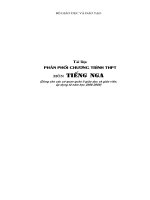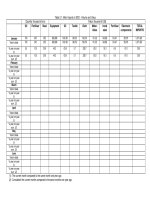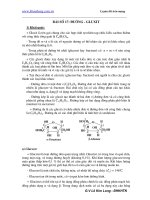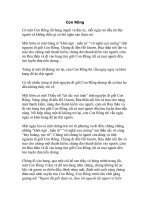Tài liệu Emily Brontë pptx
Bạn đang xem bản rút gọn của tài liệu. Xem và tải ngay bản đầy đủ của tài liệu tại đây (534.07 KB, 130 trang )
CHAPTER I.
CHAPTER II.
CHAPTER III.
CHAPTER IV.
CHAPTER V.
CHAPTER VI.
CHAPTER VII.
CHAPTER VIII.
CHAPTER IX.
CHAPTER X.
CHAPTER XI.
CHAPTER XII.
CHAPTER XIII.
CHAPTER XIV.
CHAPTER XV.
CHAPTER XVI.
CHAPTER XVII.
CHAPTER XVIII.
CHAPTER I.
CHAPTER II.
CHAPTER III.
CHAPTER IV.
CHAPTER V.
CHAPTER VI.
CHAPTER VII.
CHAPTER VIII.
CHAPTER IX.
CHAPTER X.
CHAPTER XI.
CHAPTER XII.
1
CHAPTER XIII.
CHAPTER XIV.
CHAPTER XV.
CHAPTER XVI.
CHAPTER XVII.
CHAPTER XVIII.
Emily Brontë, by A. Mary F. (Agnes Mary
The Project Gutenberg eBook, Emily Brontë, by A. Mary F. (Agnes Mary Frances) Robinson
This eBook is for the use of anyone anywhere at no cost and with almost no restrictions whatsoever. You may
copy it, give it away or re-use it under the terms of the Project Gutenberg License included with this eBook or
online at www.gutenberg.org
Title: Emily Brontë
Author: A. Mary F. (Agnes Mary Frances) Robinson
Release Date: June 14, 2008 [eBook #25789]
Language: English
Character set encoding: ISO-8859-1
***START OF THE PROJECT GUTENBERG EBOOK EMILY BRONTë***
E-text prepared by Delphine Lettau and the Project Gutenberg Online Distributed Proofreading Team
()
Eminent Women Series
Edited by John H. Ingram
EMILY BRONTË
All Rights Reserved.
EMILY BRONTË
by
A. MARY F. ROBINSON
Second Edition.
London: W. H. Allen and Co. 13, Waterloo Place 1883.
[All Rights Reserved]
London: Printed by W. H. Allen and Co., 13 Waterloo Place. S.W.
Emily Brontë, by A. Mary F. (Agnes Mary 2
CONTENTS.
PAGE
Introduction 1
Emily Brontë, by A. Mary F. (Agnes Mary 3
CHAPTER I.
Parentage 8
CHAPTER I. 4
CHAPTER II.
Babyhood 18
CHAPTER II. 5
CHAPTER III.
Cowan's Bridge 28
CHAPTER III. 6
CHAPTER IV.
Childhood 40
CHAPTER IV. 7
CHAPTER V.
Going to School 53
CHAPTER V. 8
CHAPTER VI.
Girlhood at Haworth 61
CHAPTER VI. 9
CHAPTER VII.
In the Rue d'Isabelle 77
CHAPTER VII. 10
CHAPTER VIII.
A Retrospect 92
CHAPTER VIII. 11
CHAPTER IX.
The Recall 103
CHAPTER IX. 12
CHAPTER X.
The Prospectuses 111
CHAPTER X. 13
CHAPTER XI.
Branwell's Fall 116
CHAPTER XI. 14
CHAPTER XII.
Writing Poetry 128
CHAPTER XII. 15
CHAPTER XIII.
Troubles 144
CHAPTER XIII. 16
CHAPTER XIV.
Wuthering Heights: its Origin 154
CHAPTER XIV. 17
CHAPTER XV.
Wuthering Heights: the Story 168
CHAPTER XV. 18
CHAPTER XVI.
'Shirley' 209
CHAPTER XVI. 19
CHAPTER XVII.
Branwell's End 217
CHAPTER XVII. 20
CHAPTER XVIII.
Emily's Death 223
FINIS! 233
* * * * *
LIST OF AUTHORITIES.
1846-56. The Works of Currer, Ellis, and Acton Bell.
1857. Life of Charlotte Brontë. Mrs. Gaskell. 1st and 2nd Editions.
1877. Charlotte Brontë. T. Wemyss Reid.
1877. Note on Charlotte Brontë. A. C. Swinburne.
1881. Three Great Englishwomen. P. Bayne. MS. Lecture on Emily Brontë. T. Wemyss Reid. MS. Notes on
Emily and Charlotte Brontë. Miss Ellen Nussey. MS. Letters of Charlotte and Branwell Brontë.
1879. Reminiscences of the Brontës. Miss E. Nussey.
1870. Unpublished Letters of Charlotte, Emily, and Anne Brontë. Hours at Home.
1846. Emily Brontë's Annotated Copy of her Poems.
1872. Branwell Brontë: in the "Mirror." G. S. Phillips.
1879. Pictures of the Past. F. H. Grundy.
1830. Prospectus of the Clergymen's Daughters' School at Cowan's Bridge.
1850. Preface to Wuthering Heights. Charlotte Brontë.
1850. Biographical Notice of Ellis and Acton Bell. Charlotte Brontë.
1850. Wuthering Heights: in the "Palladium." Sydney Dobell. Personal Reminiscences of Mrs. Wood, Mrs.
Ratcliffe, Mrs. Brown, and Mr. William Wood, of Haworth.
1811-18. Poems of Patrick Brontë, B.A., Incumbent of Haworth.
1879. Haworth: Past and Present. J. Horsfall Turner.
* * * * *
EMILY BRONTË.
INTRODUCTION.
There are, perhaps, few tests of excellence so sure as the popular verdict on a work of art a hundred years after
its accomplishment. So much time must be allowed for the swing and rebound of taste, for the despoiling of
CHAPTER XVIII. 21
tawdry splendours and to permit the work of art itself to form a public capable of appreciating it. Such
marvellous fragments reach us of Elizabethan praises; and we cannot help recalling the number of copies of
'Prometheus Unbound' sold in the lifetime of the poet. We know too well "what porridge had John Keats," and
remember with misgiving the turtle to which we treated Hobbs and Nobbs at dinner, and how complacently
we watched them put on their laurels afterwards.
Let us, then, by all means distrust our own and the public estimation of all heroes dead within a hundred
years. Let us, in laying claim to an infallible verdict, remember how oddly our decisions sound at the other
side of Time's whispering gallery. Shall we therefore pronounce only on Chaucer and Shakespeare, on Gower
and our learned Ben? Alas! we are too sure of their relative merits; we stake our reputations with no qualms,
no battle-ardours. These we reserve to them for whom the future is not yet secure, for whom a timely word
may still be spoken, for whom we yet may feel that lancing out of enthusiasm only possible when the cast of
fate is still unknown, and, as we fight, we fancy that the glory of our hero is in our hands.
But very gradually the victory is gained. A taste is unconsciously formed for the qualities necessary to the
next development of art qualities which Blake in his garret, Millet without the sou, set down in immortal
work. At last, when the time is ripe, some connoisseur sees the picture, blows the dust from the book, and
straightway blazons his discovery. Mr. Swinburne, so to speak, blew the dust from 'Wuthering Heights'; and
now it keeps its proper rank in the shelf where Coleridge and Webster, Hofmann and Leopardi have their
place. Until then, a few brave lines of welcome from Sydney Dobell, one fine verse of Mr. Arnold's, one
notice from Mr. Reid, was all the praise that had been given to the book by those in authority. Here and there
a mill-girl in the West Riding factories read and re-read the tattered copy from the lending library; here and
there some eager, unsatisfied, passionate child came upon the book and loved it, in spite of chiding, finding in
it an imagination that satisfied, and a storm that cleared the air; or some strong-fibred heart felt without a
shudder the justice of that stern vision of inevitable, inherited ruin following the chance-found child of foreign
sailor and seaport mother. But these readers were not many; even yet the book is not popular.
For, in truth, the qualities that distinguish Emily Brontë are not those which are of the first necessity to a
novelist. She is without experience; her range of character is narrow and local; she has no atmosphere of
broad humanity like George Eliot; she has not Jane Austen's happy gift of making us love in a book what we
have overlooked in life; we do not recognise in her the human truth and passion, the never-failing serene
bitterness of humour, that have made for Charlotte Brontë a place between Cervantes and Victor Hugo.
Emily Brontë is of a different class. Her imagination is narrower, but more intense; she sees less, but what she
sees is absolutely present: no writer has described the moors, the wind, the skies, with her passionate fidelity,
but this is all of Nature that she describes. Her narrow fervid nature accounted as simple annoyance the trivial
scenes and personages touched with immortal sympathy and humour in 'Villette' and 'Shirley'; Paul Emanuel
himself appeared to her only as a pedantic and exacting taskmaster; but, on the other hand, to a certain class of
mind, there is nothing in fiction so moving as the spectacle of Heathcliff dying of joy an unnatural, unreal
joy his panther nature paralysed, anéanti, in a delirium of visionary bliss.
Only an imagination of the rarest power could conceive such a dénouement, requiting a life of black
ingratitude by no mere common horrors, no vulgar Bedlam frenzy; but by the torturing apprehension of a
happiness never quite grasped, always just beyond the verge of realisation. Only an imagination of the finest
and rarest touch, absolutely certain of tread on that path of a single hair which alone connects this world with
the land of dreams. Few have trod that perilous bridge with the fearlessness of Emily Brontë: that is her own
ground and there she wins our highest praise; but place her on the earth, ask her to interpret for us the
common lives of the surrounding people, she can give no answer. The swift and certain spirit moves with the
clumsy hesitating gait of a bird accustomed to soar.
She tells us what she saw; and what she saw and what she was incapable of seeing are equally characteristic.
All the wildness of that moorland, all the secrets of those lonely farms, all the capabilities of the one tragedy
CHAPTER XVIII. 22
of passion and weakness that touched her solitary life, she divined and appropriated; but not the life of the
village at her feet, not the bustle of the mills, the riots, the sudden alternations of wealth and poverty; not the
incessant rivalry of church and chapel; and while the West Riding has known the prototype of nearly every
person and nearly every place in 'Jane Eyre' and 'Shirley,' not a single character in 'Wuthering Heights' ever
climbed the hills round Haworth.
Say that two foreigners have passed through Staffordshire, leaving us their reports of what they have seen.
The first, going by day, will tell us of the hideous blackness of the country; but yet more, no doubt, of that
awful, patient struggle of man with fire and darkness, of the grim courage of those unknown lives; and he
would see what they toil for, women with little children in their arms; and he would notice the blue sky
beyond the smoke, doubly precious for such horrible environment. But the second traveller has journeyed
through the night; neither squalor nor ugliness, neither sky nor children, has he seen, only a vast stretch of
blackness shot through with flaming fires, or here and there burned to a dull red by heated furnaces; and
before these, strange toilers, half naked, scarcely human, and red in the leaping flicker and gleam of the fire.
The meaning of their work he could not see, but a fearful and impressive phantasmagoria of flame and
blackness and fiery energies at work in the encompassing night.
So differently did the black country of this world appear to Charlotte, clear-seeing and compassionate, and to
Emily Brontë, a traveller through the shadows. Each faithfully recorded what she saw, and the place was the
same, but how unlike the vision! The spectacles of temperament colour the world very differently for each
beholder; and, to understand the vision, we too should for a moment look through the seer's glass. To gain
some such transient glance, to gain and give some such momentary insight into the character of Emily Brontë,
has been the aim I have tried to make in this book. That I have not fulfilled my desire is perhaps
inevitable the task has been left too long. If I have done anything at all I feel that much of the reward is due
to my many and generous helpers. Foremost among them I must thank Dr. Ingham, my kind host at Haworth,
Mrs. Wood, Mr. William Wood, Mrs. Brown, and Mrs. Ratcliffe of that parish all of whom had known the
now perished family of Brontë; and my thanks are due no less to Mr. T. Wemyss Reid, as will be seen further
on, to Mr. J. H. Ingram, and to Mr. Biddell, who have collected much valuable information for my benefit;
and most of all do I owe gratitude and thankfulness to Miss Ellen Nussey, without whose generous help my
work must have remained most ignorant and astray. To her, had it been worthier, had it been all the subject
merits, and yet without those shadows of gloom and trouble enjoined by the nature of the story; to her, could I
only have spoken of the high noble character of Emily Brontë and not of the great trials of her life, I should
have ventured to dedicate this study. But to Emily's friend I only offer what, through her, I have learned of
Emily; she, who knew so little of Branwell's shames and sorrow is unconcerned with this, their sad and
necessary record. Only the lights and sunshine of my work I dedicate to her. It may be that I have given too
great a share to the shadows, to the manifold follies and failures of Branwell Brontë. Yet in Emily Brontë's
life the shaping influences were so few, and the sins of this beloved and erring brother had so large a share in
determining the bent of her genius, that to have passed them by would have been to ignore the shock which
turned the fantasy of the 'Poems' into the tragedy of 'Wuthering Heights.' It would have been to leave untold
the patience, the courage, the unselfishness which perfected Emily Brontë's heroic character; and to have left
her burdened with the calumny of having chosen to invent the crimes and violence of her dramatis personæ.
Not so, alas! They were but reflected from the passion and sorrow that darkened her home; it was no perverse
fancy which drove that pure and innocent girl into ceaseless brooding on the conquering force of sin and the
supremacy of injustice.
She brooded over the problem night and day; she took its difficulties passionately to heart; in the midst of her
troubled thoughts she wrote 'Wuthering Heights.' From the clear spirit which inspires the end of her work, we
know that the storm is over; we know that her next tragedy would be less violent. But we shall never see it;
for and it is by this that most of us remember her suddenly and silently she died.
She died, before a single word of worthy praise had reached her. She died with her work misunderstood and
neglected. And yet not unhappy. For her home on the moors was very dear to her, the least and homeliest
CHAPTER XVIII. 23
duties pleasant; she loved her sisters with devoted friendship, and she had many little happinesses in her
patient, cheerful, unselfish life. Would that I could show her as she was! not the austere and violent poetess
who, cuckoo-fashion, has usurped her place; but brave to fate and timid of man; stern to herself, forbearing to
all weak and erring things; silent, yet sometimes sparkling with happy sallies. For to represent her as she was
would be her noblest and most fitting monument.
CHAPTER XVIII. 24
CHAPTER I.
PARENTAGE.
Emily Brontë was born of parents without any peculiar talent for literature. It is true that her mother's letters
are precisely and prettily written. It is true that her father published a few tracts and religious poems. But in
neither case is there any vestige of literary or poetical endowment. Few, indeed, are the Parish Magazines
which could not show among their contents poems and articles greatly superior to the weak and characterless
effusions of the father of the Brontës. The fact seems important; because in this case not one member of a
family, but a whole family, is endowed in more or less degree with faculties not derived from either parent.
For children may inherit genius from parents who are themselves not gifted, as two streaming currents of air
unite to form a liquid with properties different from either; and never is biography more valuable than when it
allows us to perceive by what combination of allied qualities, friction of opposing temperaments, recurrence
of ancestral traits, the subtle thing we call character is determined. In this case, since, as I have said, the whole
family manifested a brilliance not to be found in either parent, such a study would be peculiarly interesting.
But, unfortunately, the history of the children's father and the constitution of the children's mother is all that is
clear to our investigation.
Yet even out of this very short pedigree two important factors of genius declare themselves two potent and
shaping inheritances. From their father, Currer, Ellis, and Acton derived a strong will. From their mother, the
disease that slew Emily and Anne in the prime of their youth and made Charlotte always delicate and ailing.
In both cases the boy, Patrick Branwell, was very slightly affected; but he too died young, from excesses that
suggest a taint of insanity in his constitution.
Insanity and genius stand on either side consumption, its worse and better angels. Let none call it impious or
absurd to rank the greatest gift to mankind as the occasional result of an inherited tendency to tubercular
disease. There are of course very many other determining causes; yet is it certain that inherited scrofula or
phthisis may come out, not in these diseases, or not only in these diseases, but in an alteration, for better or for
worse, of the condition of the mind. Out of evil good may come, or a worse evil.
The children's father was a nervous, irritable and violent man, who endowed them with a nervous organisation
easily disturbed and an indomitable force of volition. The girls, at least, showed both these characteristics.
Patrick Branwell must have been a weaker, more brilliant, more violent, less tenacious, less upright copy of
his father; and seems to have suffered no modification from the patient and steadfast moral nature of his
mother. She was the model that her daughters copied, in different degrees, both in character and health.
Passion and will their father gave them. Their genius came directly from neither parent; but from the
constitution of their natures.
In addition, on both sides, the children got a Celtic strain; and this is a matter of significance, meaning a
predisposition to the superstition, imagination and horror that is a strand in all their work. Their mother, Maria
Branwell, was of a good middle-class Cornish family, long established as merchants in Penzance. Their father
was the son of an Irish peasant, Hugh Prunty, settled in the north of Ireland, but native to the south.
The history of the Rev. Patrick Brontë, B.A. (whose fine Greek name, shortened from the ancient Irish
appellation of Bronterre, was so naïvely admired by his children), is itself a remarkable and interesting story.
The Reverend Patrick Brontë was one of the ten children of a peasant proprietor at Ahaderg in county Down.
The family to which he belonged inherited strength, good looks, and a few scant acres of potato-growing soil.
They must have been very poor, those ten children, often hungry, cold and wet; but these adverse influences
only seemed to brace the sinews of Patrick Prunty and to nerve his determination to rise above his
surroundings. He grew up a tall and strong young fellow, unusually handsome with a well-shaped head,
CHAPTER I. 25









